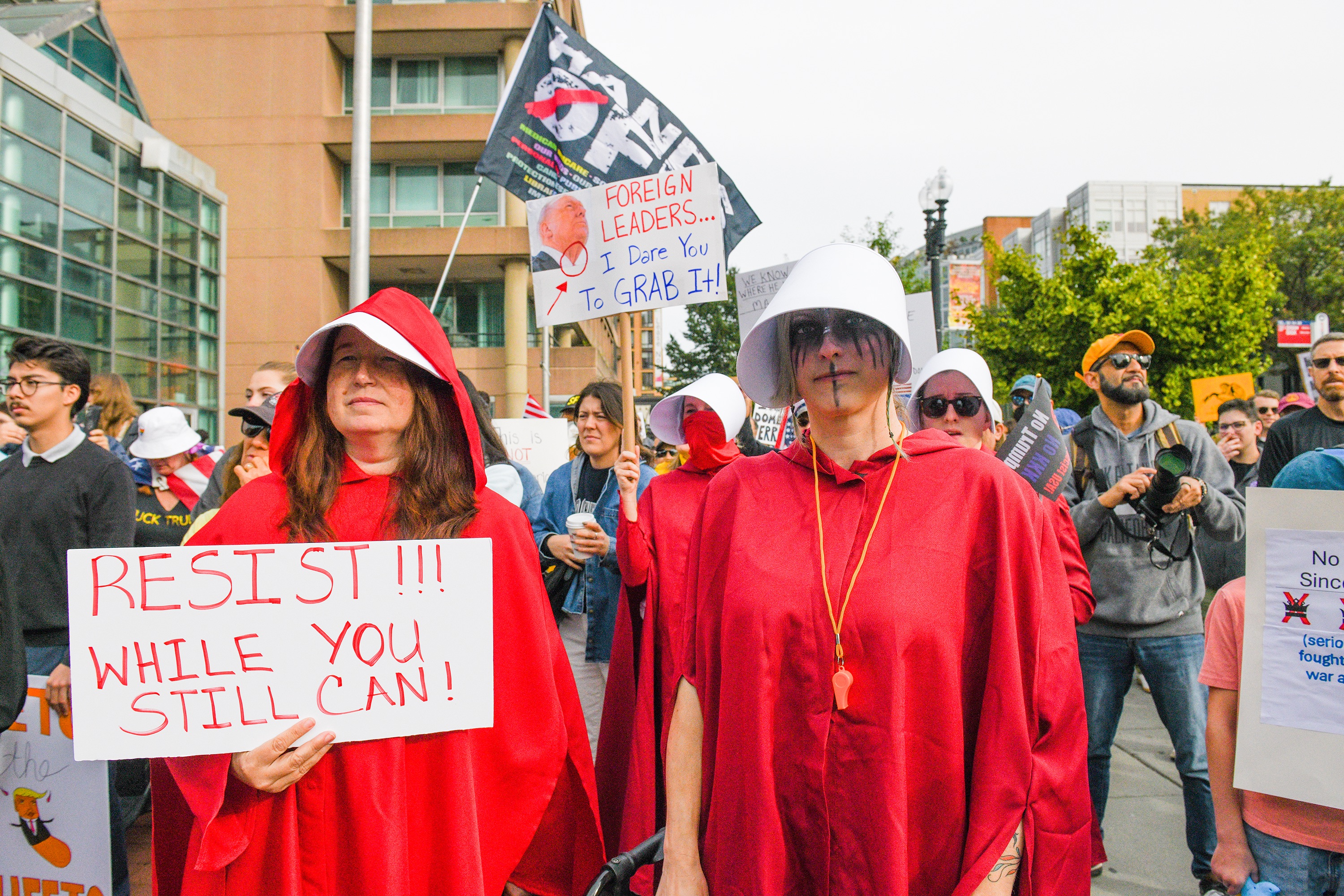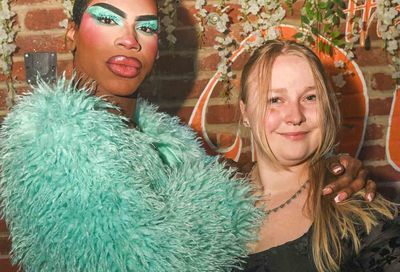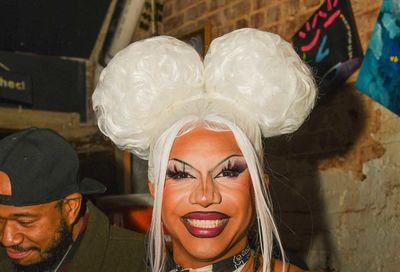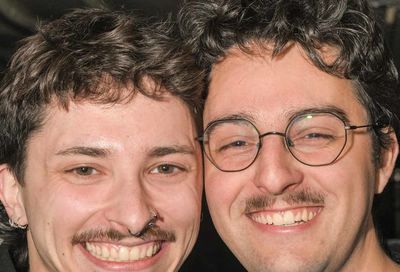Finding the Bridge
Darlene Nipper ponders the end of her appointment as the mayor's liaison the GLBT community, her call to God, and the state of gay D.C.
It was an emotional appointment for Darlene Nipper and much of the district’s GLBT community. Her predecessor, Wanda Alston — the first to head Mayor Anthony Williams’s Office of LGBT Affairs after it was made permanent in 2004 — was violently murdered by a drug-addled neighbor in March 2005.
While that could be jarring in and of itself, Alston and Nipper had been close friends for years. Today, after eight months as Williams’s liaison to the gay community, Nipper continues to wear her signature pendant, the Chinese symbol for longevity. Alston wore the very same pendant — it was a gift from Nipper years ago.
”I knew Wanda for about 17 years,” Nipper said shortly before starting her job for Mayor Williams. ”We’d been the closest of friends. She became a really close friend to my entire family.”
 Nipper |
But life goes on, and Nipper has had these months to settle into the routine of her office. She will, however, be marking her one-year anniversary on the job with a question mark. With January comes the end of Williams’s occupancy of the mayor’s office. As a political appointee, Anacostia-born Nipper says she is fully aware that she may be among those vacating the John A. Wilson Building to make room for a new troupe of appointees.
She does not seem to be losing any sleep, though, and remains effervescently charismatic. Perhaps her recent ordination has given the Rev. Nipper a more peaceful view of the universe and city politics — on a hot August afternoon, she certainly doesn’t seem troubled at all. There’s still work to be done, and she seems happy to do it. She even used her drive to this interview as a chance to offer directions to a lost driver on 14th Street.
It was an opportunity, she says, to build a bridge.
METRO WEEKLY: I hear you recently become an ordained minister.
DARLENE NIPPER: It happened in June.
MW: A Pride season ordination.
NIPPER: And I don’t know how I managed to do it, because it was a very busy month.
MW: What’s your denomination?
NIPPER: I’m actually an Interfaith minister. Interfaith ministers draw from all the traditions, everything you can imagine, and try to find place where they intersect. It’s truly across the board. We try to find the spark of divinity in any of the traditions and how they reinforce the dignity of human life.
MW: How long had you been pursuing this?
NIPPER: It was a little over two years ago that I started, just like a master’s in divinity. In an interfaith seminary, the focus is very much on the practical, the nuts and bolts of ministry. Lots of people go from this to marrying people.
MW: Have you done that yet?
NIPPER: I haven’t done it yet. I’ve been asked a couple of times. Depending on dates when folks get together, I may be able to do that soon.
MW: What faith tradition were you raised with?
NIPPER: I was raised Catholic. Like most good Catholics — especially the GLBT Catholics — I’ve looked at a number of other traditions. [Laughs.] There are things I like about Catholicism, frankly.
MW: As Mayor Williams’s liaison to the GLBT community, you’re at the eight-month mark. How has it been?
NIPPER: First of all, it’s just been an amazing ride. I don’t think I could’ve imagined the level of intensity and the amount of work there is to do. There are just so many different points on the map this work really touches. Everything from people who are dealing with issues of poverty and access to health insurance, to things like gay marriage.
MW: What’s your typical day like?
NIPPER: My day is typically something like this: I may have a meeting with the Office of Human Rights because a concern has been raised by a citizen about a particular business or a D.C. government agency with regard to the way they’ve been treated, as a member of the GLBT community. I’ll assist that individual with determining what the process is for filing a formal complaint.
On the backside of that, my question is: Have we as a government employed the right policies to ensure that our agencies are treating people with respect? If it’s outside of government, have we educated the business community about what their responsibilities are with regard to non-discrimination [and] the GLBT community?
I communicate those things to the mayor, if necessary. Sometimes I’m able to handle it myself by just saying, ”This is the law,” and that we need to move in this or that direction.
MW: In that anything relating to ”GLBT” can fall on your shoulders, do you have the resources you need?
NIPPER: No government person would ever say that they have all the resources they need. [Laughs.] One aspect of the job is really being innovative in terms of ensuring that the agencies within the government are meeting the needs of all citizens. My mindset is that I have every resource in this government. The mayor certainly feels strongly about this, so that’s the way I approach it — as though every aspect of this government is a resource for the GLBT community, and I ought to have access to those resources and make sure they are actually serving our community well.
MW: Your GLBT office is a newer addition to the D.C. government. Do you have to build respect for it?
NIPPER: It’s a very well respected office. Even though I am doing something new, I have a foundation to stand on.
MW: Support for the office has not been unanimous. The Gay and Lesbian Activists Alliance of Washington, D.C. (GLAA), for example, opposed making the office permanent. Have you had reason to work with the GLAA nonetheless?
NIPPER: First of all, I just absolutely respect GLAA and, in particular, [GLAA Vice President of Political Affairs] Rick Rosendall. One of the problems that happens is you think of the gay community as a distinct group — and it’s not. It’s a very diverse group. So a voice like GLAA is as valid and important a voice as others. But I’m really more concerned about the voices of people who typically go unheard. I’m not as concerned about the GLAA. Not because their issues aren’t important — they’re vitally important — but because they know how to get their voice heard. We really need to begin to help other citizens whose needs we tend to overlook.
MW: Back-to-school season reminds us of a group with a smaller voice: GLBT youth. What’s the situation like for queer youth in the district?
NIPPER: Bullying is an issue for kids across the board. Groups that advocate for young people have begun to hear what they think is a heightened experience with bullying. Either kids are expressing that more, or it’s happening more. Bullying is always a huge concern, but especially for our kids — that’s the biggest issue. And there are health concerns, and things like coming out. Dealing with an intense issue like coming out, on top of bullying, is very difficult.
And look at all the things kids have to worry about today. I come from Anacostia and I didn’t have the kinds of worries kids have now. They worry about violence and friends and family who are HIV-positive. The issues are compounded when you add sexual orientation. And more transgender youth are expressing themselves.
MW: Is that a positive sign, that transgender youth are more comfortable expressing themselves?
NIPPER: It’s positive. It’s just that given our society, expressing themselves earlier can bring some challenges. We want to protect them from those challenges. There’s some good work going on with organizations like SMYAL [the Sexual Minority Youth Assistance League] and P-FLAG [Parents, Families and Friends of Lesbians and Gays]. P-FLAG is doing an education and support-type group with some of the high schools.
MW: Closer to home, you and your partner have informally adopted a young lesbian.
NIPPER: She’s grown now. She moved in when she was, I think, 17 — about to turn 18. She’s 25 now. She’s a very well-known lesbian activist in the city by the name of Angel Brown. She works at [the National Youth Advocacy Coalition] and was featured in The Advocate, in the ”up-and-coming youth” article they did last year.
MW: How did you meet her?
NIPPER: My partner, Katrina [Higgins], worked at SMYAL, and at NYAC under Craig Bowman, and she met Angel there. Katrina mentored her for maybe a year. At one point, she found out that Angel was living in a situation that wasn’t suitable. I think she was sleeping on someone’s sofa. Katrina suggested she move in with us, and she did. We’re her gay moms.
MW: Would you like to see more of these mentoring/fostering arrangements in the community?
NIPPER: Absolutely. I have been doing some work in the youth area with my staff person, M’Bwende Anderson, who used to be the deputy director at NYAC. She and I have been working with the foster-care system. Wanda [Alston] had done some work with this early on, before she died, and the foster system has been very open, but not sure how to deal with the GLBTQ youth in their system. A lot of these kids are going to be in city-run homes before transitioning into homes with foster parents. There is a mentoring program through the Child and Family Services Administration. I worked with M’Bwende to get them to develop a GLBTQ youth task force, which they just started. It’s a concrete plan for creating a full spectrum of safe places for the [GLBT] youth in their system.
MW: If someone wants to become a foster parent or a mentor, would your office be able to help?
NIPPER: Yes. They can come to our office and we can direct them. We have a mentoring program, but sometimes no one shows up to do the mentoring. Where do you start to identify GLBT adults who would be good mentors? I think SMYAL is beginning to ask people.
MW: Aside from kids going back to school this time of year, this weekend also marks the opening of a new gay-owned bar, Be Bar. This venue’s struggle for a liquor license shined a light on discord in the district between segments of the religious community and of the gay community. From your office, what can you do to ease this sort of friction?
NIPPER: This is one of those age-old problems. What we can do as a community is really broaden our focus on community building. It’s critically important. This type of relationship building has to be an ongoing thing. As a community, we really have to focus on how we interact with other folks. We all live on the same city streets, so we might all care about trash pickup or rodents, access to health care, whatever. These things cross over the issues that are specific to any one community, whether it’s black, gay or religious. Deep down inside, we’re all very, very much alike. We’re not as far from the people that we think of as evil as we want to be. It’s true you’re not going to turn a bigot into a non-bigot. We recognize that. But you certainly can find yourself on the same side of the street sometimes.
A prime example is Philip Pannell. He was saying the other day, ”I’m still the treasurer of the Ballou Senior High School Parent-Student-Teacher Association.” This is brilliant. He wants to show people that he cares about the community. That is a brilliant strategy. People have seen him in that role for years. If Phil was going to open a gay bar [in that neighborhood], I can guarantee you there would be some split decisions. There might be some folks who would be against it. But some would consider it because they’ve learned about a human being. They’ve engaged with someone who’s cared about their issues. Phil has stepped out of his comfort zone — he doesn’t have any children — to say to these people, ”I care about your children because we’re all in this community.” I think we have to do more of that.
MW: Speaking of comfort zones, within our own GLBT community, how well are we integrating among one another?
NIPPER: I think the mayor was saying recently that there was a study showing that D.C. is among the more segregated — racially, anyway — cities in the country. We within the GLBT community are too. We are relatively segregated in a lot of ways. When I talk about building bridges, I’m not saying necessarily outside of the GLBT community. We all have a comfort zone. I certainly have mine. But it’s important for me and everyone else to reach out across apparent differences of race, socioeconomic status or access within our community.
We have a lot of work to do and I actually had a fantastic idea that I’m afraid to even talk about because I’m afraid it won’t happen before I get canned. I’m going to try to do at least one of these ”community conversations” where small groups of very apparently different people within the GLBT community get together and talk about issues that we think are separating us. Or what kinds of things do we think are bringing us together? What kinds of things are separating us?
My grand idea is to do something really simple. Have dinner with this really mixed group and chat about the stuff that’s really underneath, and let some of that bubble up. Probably it’s some of that stuff that we don’t talk about that much that’s preventing us from doing the work that needs to be done.
 Nipper at D.C. Coalition panel (Photo by Rudy Lawidjaja) |
MW: The D.C. Coalition panel you were on in April, ”The State of the Black Gay Community,” was crowded. It seems that there is a thirst for this sort of dialogue.
NIPPER: This would be taking that to a more intimate level. What we have to do, and I’m saying this as an African-American woman, is stop believing that automatically no one else has that same thirst. We have to do what [the D.C. Coalition] did. They weren’t sure, but they put it out there and bam! — everybody showed up. Let’s see what the thirst is from these other community members. I would love to do the white-black thing because I’m fascinated by it. I can’t believe it has so much prevalence even now. There’s still so much resonance underneath about race. Those are the kinds of things that we tend not to talk about.
|
MW: You mentioned getting ”canned.” Is that what you’re thinking about as Mayor Williams prepares to leave office?
NIPPER: We’re trained to think about one appointment and one mayor at a time. I work for Mayor Williams. One thing I can say is that I feel pretty confident that the [mayoral] candidates that are out there are, for the most part, supportive of the GLBT community. I can’t say that I will be the person they will want to have in this job.
MW: Does the thought of stepping down have any appeal? Does this job burn you out?
NIPPER: [Laughs.] No one can get burned out this quickly! Unfortunately, I have to be realistic with the fact that I was appointed by Mayor Williams. We’ll see what happens next. I’m certainly open to doing whatever I can to make sure the office is effective, whether that means staying or helping with the transition to someone else.
MW: Professionally, what else might you pursue?
NIPPER: What I see as the theme in my life and work is extending myself in service to other people. I like to help people and I like to especially help communities that are somehow disenfranchised. I have a very extensive health-advocacy background, and I could do that kind of work. I’m a minister, although ministers don’t make money. Well, actually, many of them do. [Laughs.]
Before I came to this, I was recovering from breast cancer and doing my own consulting work as a health advocacy and diversity-relations person. I have all of that to fall back on. I’m confident that the right thing will appear, and I’m sure that it will be around wellness and advocating for the needs of disenfranchised groups.
MW: You have talked a lot about substance abuse, mental health. Are you involved with the Crystal Meth Working Group?
NIPPER: We’ve worked together in different capacities. What we did with the Crystal Meth Working Group primarily is discuss public safety and the Police Departmen,t to help the police think about how they engage with our community. And I have someone from the Working Group on the Mayor’s Advisory Committee who advises my office.
We have to remember that our community members are still engaging in all types of misuse and abuse of substances. That and the mental-health issues are — again, like the racial dialogue — are the kinds of things we don’t typically talk about. We don’t talk about mental health. We don’t talk about substance abuse. But these are things that are holding us back. We need to find resources specifically allocated to GLBT people to address these issues, and find places where we feel safe to get the help that we need.
MW: We can’t talk about health in D.C. without hitting HIV.
NIPPER: We’ve learned some things about making sure that our surveillance department — our understanding of who’s being affected and infected with HIV — is topnotch. That is critically important. You need to understand the numbers. You have to determine who is actually living with HIV — not their names, that’s not important. But you have to know the extent of your epidemic so that you can plan the prevention and education and treatment programs. If you don’t have an understanding of the numbers, how can you do that?
On the other side, with Dr. Marsha Martin [director, D.C. Dept. of Health’s HIV/AIDS Administration], you’ve seen a campaign to get everyone tested. Automatic testing in jails changed everything. People who go in definitely come back out into the community. Dr. Martin was saying it’s important for us to know the HIV status before that person comes out of the jail, because you can provide them with health care and the kind of education and tools that they need to live a healthy lifestyle when they’re back in the community. I don’t know how many jurisdictions around the country are actually doing that, but I know that we’re doing it here.
I was one of the first women to go out on the street and do HIV/AIDS street education and outreach and it was an intensive street level outreach. I was going directly to the people injecting drugs and talking to them about this and making sure they understood how to clean their needles because we didn’t have anything close to needle exchange. We went from that kind of intensity to a bit of a lull. The level of intensity has to remain extremely high.
MW: With HIV, is that an area where there could be coalition building between the gay community and churches offering HIV/AIDS services?
NIPPER: I think so. There’s a lot to be learned. When gay, white men were facing this problem, there was some serious coalition building with folks who were working in the medical profession and with researchers and community organizations. That effective approach can also be communicated to the black churches, for example, in their process of dealing with young black women who are increasing their exposure to HIV. But we have to remember that the majority of people in this city most likely who are HIV-positive are black and Latino men who are having sex with men. We tend to have this problem where we shift [prevention] from one community to another. That’s understandable to an extent, because you may have strategies for reaching one community or another so you hone in on a group. But I think it would be a disservice for us in D.C. to focus solely on young black women when there are these young black men who also are affected.
MW: As the head of the Office of LGBT Affairs in the nation’s capital, how would you characterize our community’s position at this particular point in history?
NIPPER: I don’t think there’s a person in this city who can’t say we’ve progressed tremendously. This is a city where GLBT people are valued. As the capital, I hope we really are a metaphor for the rest of the country, because I think we have a lot of GLBT people from all different racial and economic backgrounds. This is so important. You have a lot of GLBT people in this city who are African-American. We talk about some of the African-American churches in the city being against the GLBT lifestyle. Actually, this city is a pretty comfortable place.
I think our policies are good. We have domestic partnership, which has been vastly expanded. We have this office, which is a permanent, cabinet-level office. We have a human rights law that has been on the books, but has been clarified to include gender identity or expression.
I think in a lot of ways we have a very progressive set of policies behind us, though I think everyone would admit that we can continue to get better. This is a lovely place to live for a person who is a member of our community.
Support Metro Weekly’s Journalism
These are challenging times for news organizations. And yet it’s crucial we stay active and provide vital resources and information to both our local readers and the world. So won’t you please take a moment and consider supporting Metro Weekly with a membership? For as little as $5 a month, you can help ensure Metro Weekly magazine and MetroWeekly.com remain free, viable resources as we provide the best, most diverse, culturally-resonant LGBTQ coverage in both the D.C. region and around the world. Memberships come with exclusive perks and discounts, your own personal digital delivery of each week’s magazine (and an archive), access to our Member's Lounge when it launches this fall, and exclusive members-only items like Metro Weekly Membership Mugs and Tote Bags! Check out all our membership levels here and please join us today!

























